-
REVIEW01-01-2018
Institutional violence during the parturition process in Brazil: integrative review
Revista Brasileira de Enfermagem. 2018;71(3):1152-1161
Abstract
REVIEWInstitutional violence during the parturition process in Brazil: integrative review
Revista Brasileira de Enfermagem. 2018;71(3):1152-1161
DOI 10.1590/0034-7167-2017-0238
Views0See moreABSTRACT
Objective:
To identify the types of institutional violence of childbirth reported by the woman, the birth companion and health professionals.
Method:
Integrative review that analyzed 33 articles in the LILACS, BDENF, INDEXPSI, regional SciELO, Scopus, Web Of Science and PubMed databases.
Results:
Women were the main violence rapporteur, with predominance of the psychological type. Precarious infrastructure and the imposition of professional decisions were identified by the companion as violence. For health professionals, performing procedures without consent does not characterize violence, but guarantees childbirth security.
Final considerations:
The most common types of violence in Brazilian maternity hospitals are psychological, physical and structural. Most of the time, violence is reported by women, although professionals also perceive and admit its perpetuation.
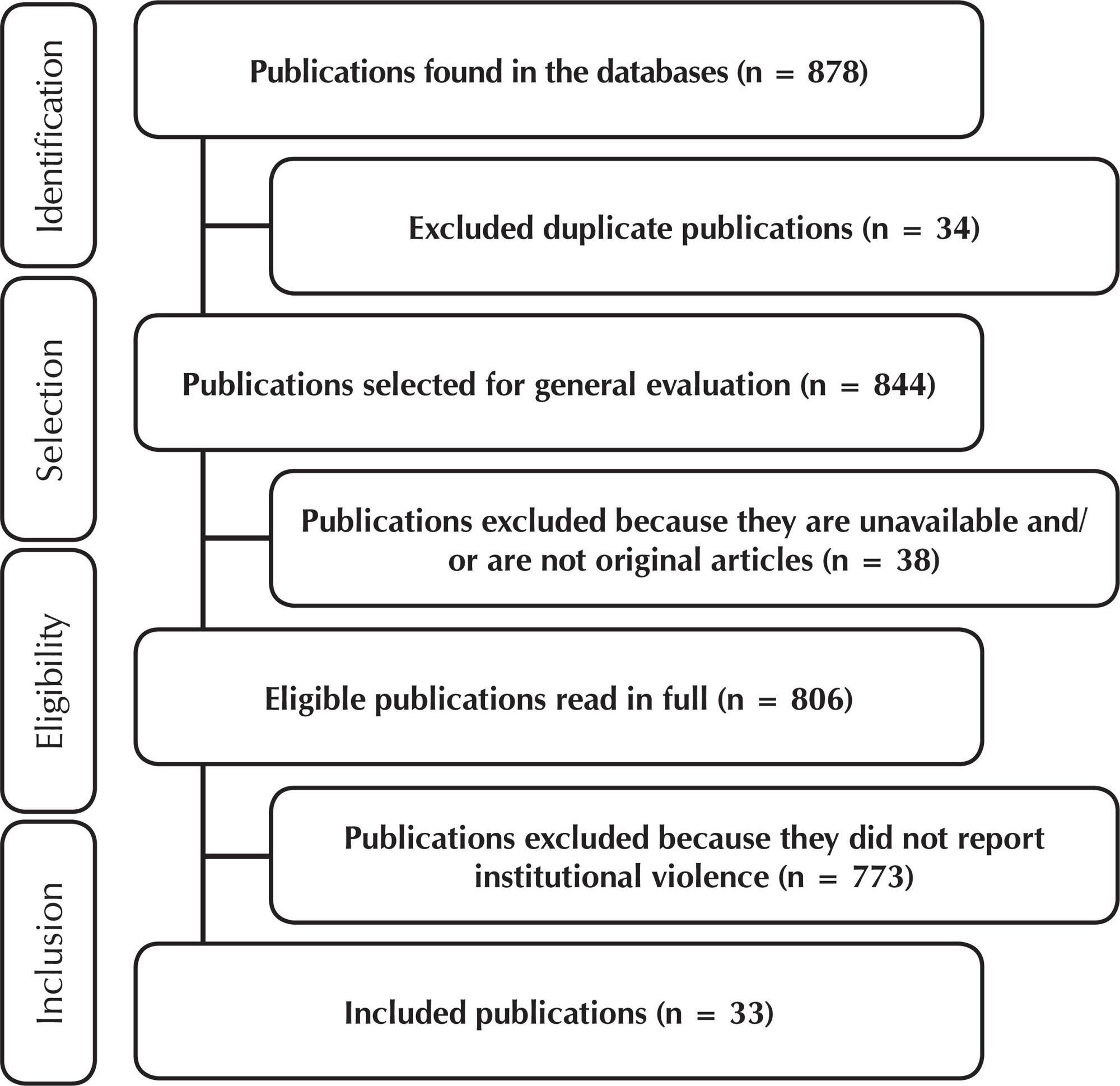
-
RESEARCH01-01-2018
Education practices: research-action with nurses of Family Health Strategy
Revista Brasileira de Enfermagem. 2018;71(3):1144-1151
Abstract
RESEARCHEducation practices: research-action with nurses of Family Health Strategy
Revista Brasileira de Enfermagem. 2018;71(3):1144-1151
DOI 10.1590/0034-7167-2017-0284
Views0See moreABSTRACT
Objective:
to identify the factors that determine the implementation of educational practices of health promotion and to construct proposals to implement the educational actions of the nurses of the Family Health Units (FHU).
Method:
research-action in which individual interviews and focus group were conducted, with 17 nurses from 12 FHU in the city of Cruzeiro do Sul, Acre state, Brazil. The results were organized by the thematic analysis method.
Results:
the thematic units emerged from the analysis: dichotomy between knowledge and doing in the production of care and health; the nurse’s qualification for educational practices; and conditions favorable to health education practices.
Conclusion:
the thematic analysis showed that the educational practice is hampered by the high demand for care in the unit, lack of physical structure and professional qualification for health education. In the action phase, nurses and local managers agreed on actions to improve the quality of educational practices.
-
RESEARCH01-01-2018
Qualification of the family caregiver to the application of the Educational Technology in Health
Revista Brasileira de Enfermagem. 2018;71(3):1135-1143
Abstract
RESEARCHQualification of the family caregiver to the application of the Educational Technology in Health
Revista Brasileira de Enfermagem. 2018;71(3):1135-1143
DOI 10.1590/0034-7167-2017-0163
Views0See moreABSTRACT
Objective:
To evaluate the changes in the participation of the family caregiver in the treatment of the hypertensive person with the application of the Educational Technology in Health (ETH).
Method:
Participant research carried out in a Primary Health Care Unit with 11 family caregivers (FC). The ETH was elaborated based on health education and applied in ten meetings between June and August 2016. We organized the results into categories.
Results:
FCs experienced learning experiences through the exchange of information, socialization of experiences, and linkage establishments. The FCs were encouraged to share their doubts and experiences, so that, supported by listening to the professional, they felt welcomed and determined to fulfill their role with hypertensive relatives.
Final considerations:
The changes that have taken place have been highlighted in the learning of FCs and their commitment to family and self-care, as well as to the conviction that the family environment is indicated to make these changes effective.
-
RESEARCH01-01-2018
Discursive archaeology: constituting knowledge of militant nurses in trade associations
Revista Brasileira de Enfermagem. 2018;71(3):1128-1134
Abstract
RESEARCHDiscursive archaeology: constituting knowledge of militant nurses in trade associations
Revista Brasileira de Enfermagem. 2018;71(3):1128-1134
DOI 10.1590/0034-7167-2017-0277
Views0See moreABSTRACT
Objective:
To analyze the constituting knowledge of militant nurses in trade associations.
Method:
Historical research, based on the oral history method, with a qualitative approach carried out with 11 nurses who are/were militants for professional issues since the 1980s in the state of Bahia. The data collected through semi-structured interviews were organized in the software n-vivo 10 and analyzed based on dialectical hermeneutics.
Results:
We identified pedagogical, administrative, public health, sociological, and trade union background knowledge as constituent of militant individuals.
Final considerations:
The constituting knowledge of militant nurses are inscribed in the Social Sciences, distanced from biomedical knowledge and power, pointing at ways for structuring nursing curricula. We identified the Brazilian Association of Nursing as a space for political formation.
-
RESEARCH01-01-2018
Coordination of health care with the community in the clinical management of tuberculosis
Revista Brasileira de Enfermagem. 2018;71(3):1122-1127
Abstract
RESEARCHCoordination of health care with the community in the clinical management of tuberculosis
Revista Brasileira de Enfermagem. 2018;71(3):1122-1127
DOI 10.1590/0034-7167-2017-0255
Views0See moreABSTRACT
Objective:
determine the coordination of Primary Health Care with community resources in the clinical management of tuberculosis.
Method:
descriptive study, of quantitative approach, with participation of one hundred health professionals. Part of a questionnaire was used in evaluating local institutional capacity for the model of chronic conditions care, adapted for tuberculosis care.
Results:
the coordination between health units, individuals with tuberculosis, and community organizations; the partnerships between institutions and local health councils/committees showed limited capacity. On the other hand, the component for the participation of the Community Health Agent presented more favorable capacity.
Conclusion:
the municipality has unfavorable capacity for coordination of health units and the community. It is reinforced the need to promote these coordinations in search of symptomatic cases in the communities, in the directly observed treatment, and in promoting the association between different social actors.
-
RESEARCH01-01-2018
Central venous catheter for hemodialysis: incidence of infection and risk factors
Revista Brasileira de Enfermagem. 2018;71(3):1115-1121
Abstract
RESEARCHCentral venous catheter for hemodialysis: incidence of infection and risk factors
Revista Brasileira de Enfermagem. 2018;71(3):1115-1121
DOI 10.1590/0034-7167-2017-0047
Views0See moreABSTRACT
Objective:
To measure the incidence of infection in short-term central venous catheter for hemodialysis and to identify the associated risk factors.
Method:
Prospective cohort study conducted in a teaching hospital from September 2015 to April 2016. Patients requiring central venous catheter for hemodialysis were included and data was collected through direct and systematic observation of the catheter insertion procedure by the researchers.
Results:
The final sample consisted of 69 patients, who used 88 catheters. The incidence of infection was 9.1%, and the risk factors were length of hospital stay and insertion of the catheter in the left femoral vein.
Conclusion:
The observation of the actions performed during the insertion of the catheter made it possible to identify the risk factors associated with infection, and the research protocol may have contributed to the reduction of infection rates.
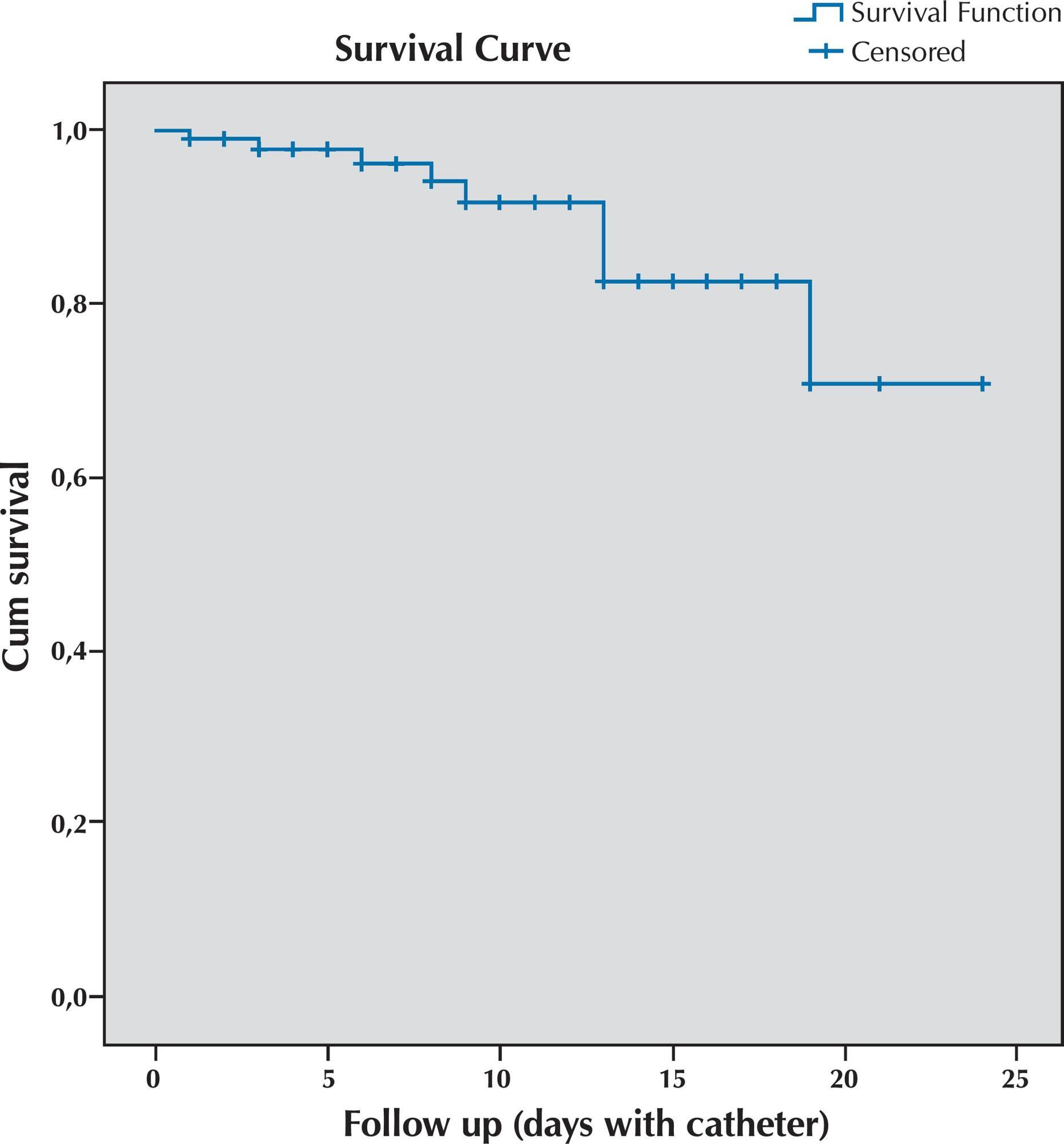
-
RESEARCH01-01-2018
Validation of a care protocol for the septic patient in the Intensive Care Unit
Revista Brasileira de Enfermagem. 2018;71(3):1106-1114
Abstract
RESEARCHValidation of a care protocol for the septic patient in the Intensive Care Unit
Revista Brasileira de Enfermagem. 2018;71(3):1106-1114
DOI 10.1590/0034-7167-2017-0312
Views0See moreABSTRACT
Objective:
to elaborate and validate a protocol for the care of the nurse to the septic patient in Intensive Care Units (ICUs).
Method:
instrument validation study. Two steps were followed: instrument development and content validation according to the Delphi technique.
Results:
the validation of contents related to the nurse’s assistance to the septic patient in intensive care was initially composed of eighteen items analyzed by the evaluators/judges. From this, through the Content Validity Index (CVI), thirteen items with strong evidence of validation were identified, CVI = 0.79. Then the instrument was refined, being then composed of fifteen items, which in the second phase Delphi had a percentage of agreement above 84% for the variables pertinent to the protocol.
Conclusion:
the method was effective to validate the contents of a protocol for the nurse’s assistance to the septic patient in the ICU.
-
RESEARCH01-01-2018
Assessment of the care process with orthotics, prosthetics and special materials
Revista Brasileira de Enfermagem. 2018;71(3):1099-1105
Abstract
RESEARCHAssessment of the care process with orthotics, prosthetics and special materials
Revista Brasileira de Enfermagem. 2018;71(3):1099-1105
DOI 10.1590/0034-7167-2017-0031
Views0See moreABSTRACT
Objective:
to assess potential failures in the care process with orthotics, prosthetics and special materials in a high-complexity hospital.
Method:
an intervention study conducted from March to October 2013. This process was assessed with the Failure Mode and Effects Analysis (FMEA) service tool. The data were analysed according to the risk and the corrective measures were defined.
Results:
no failure was classified as high risk and the corrective measures indicated as low and moderate risk had the following improvement initiatives suggested: standardize the material records in the information system; create a specific form to require materials; hire specialized technical personnel and create a continuous education program.
Conclusion:
all the suggested initiatives were implemented and helped to reduce the assistance risks for patients due to failures in this process. The actions increase safety levels and provide higher quality of service.
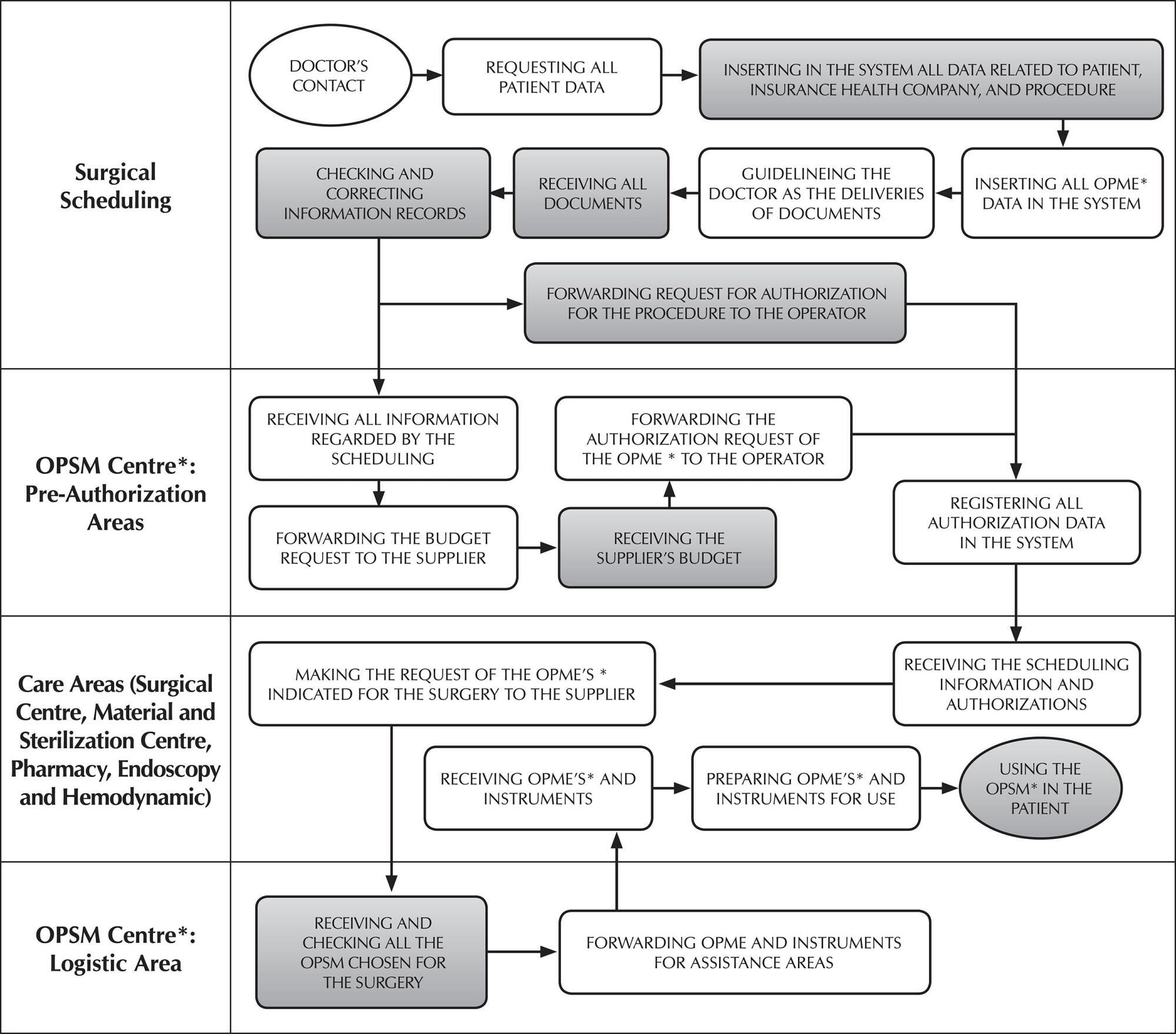
-
ORIGINAL ARTICLE09-16-2019
Validation of educational booklet: an educational technology in dengue prevention
Revista Brasileira de Enfermagem. 2019;72(5):1318-1325
Abstract
ORIGINAL ARTICLEValidation of educational booklet: an educational technology in dengue prevention
Revista Brasileira de Enfermagem. 2019;72(5):1318-1325
DOI 10.1590/0034-7167-2018-0771
Views0See moreABSTRACT
Objective:
to validate a booklet on dengue prevention in order to make it an educational technology to be used with the population.
Method:
methodological study, carried out with two groups of judges specialized in health and other areas. For data analysis, the calculation of Content Validity Index was carried out.
Results:
the booklet, in general, was considered valid by the expert judges, since it obtained an overall CVI of 70%. However, it has undergone a textual and aesthetic re-elaboration. The changes were based on the substitution of expressions, phrases, information additions and language adequacy. The illustrations were redone, adding clarity, expressiveness, movement, interaction and contextualization.
Conclusion:
the booklet is valid to be used for the population, with the purpose of informing, in a playful way, the forms of prevention and combat to mosquito transmitting dengue.

-
REVIEW09-18-2020
Mental health of healthcare professionals in China during the new coronavirus pandemic: an integrative review
Revista Brasileira de Enfermagem. 2020;73:e20200338
Abstract
REVIEWMental health of healthcare professionals in China during the new coronavirus pandemic: an integrative review
Revista Brasileira de Enfermagem. 2020;73:e20200338
DOI 10.1590/0034-7167-2020-0338
Views0See moreABSTRACT
Objective:
to identify publishing related to the mental health of health professionals working in the front line of the COVID-19 pandemic.
Methods:
an integrative review that included primary articles indexed in the Latin American and Caribbean Literature in Health Sciences, Medical Literature Analysis and Retrieval System Online, Cumulative Index to Nursing and Allied Health Literature, Scopus, Embase, Web of Science, Science Direct databases and US National Library of Medicine databases. The result analysis was performed descriptively, in four analytical categories.
Results:
The publishing involved aspects related to insufficient personal protective equipment, feelings of fear and stigma, the need for psychological and psychiatric support and the possibility of post-outbreak mental disorders.
Conclusion:
All mentioned aspects have a direct impact on the mental health of professionals, demanding the creation of strategies that minimize the emotional burnout of workers, considering that each country and culture reacts differently to the disease.

-
ORIGINAL ARTICLE06-27-2019
Religious/spiritual coping and level of hope in patients with cancer in chemotherapy
Revista Brasileira de Enfermagem. 2019;72(3):640-645
Abstract
ORIGINAL ARTICLEReligious/spiritual coping and level of hope in patients with cancer in chemotherapy
Revista Brasileira de Enfermagem. 2019;72(3):640-645
DOI 10.1590/0034-7167-2018-0358
Views0See moreABSTRACT
Aim:
To demonstrate the relationship between religious/spiritual coping and hope in cancer patients undergoing chemotherapy.
Method:
This is a cross-sectional, descriptive study with a quantitative approach performed in a reference outpatient clinic in Caruaru, PE, between August and October 2017. A total of 82 cancer patients undergoing chemotherapy were included in the study, using the brief religious/spiritual coping scale (RCOPE-Brief) and the Herth Hope Scale (HHS).
Results:
The sample presented mean positive RCOPE scores (3.03 ± 0.41) and the level of hope was considered high (42.7 points ± 3.67). Patients who had a high RCOPE score were found to have a higher mean of Herth’s level of hope (44.12 points).
Conclusion:
This study becomes relevant to nursing professionals by encouraging care that takes into account the patient’s spiritual dimension in order to stimulate positive mechanisms of religious coping and, consequently, raise the levels of hope.
-
ORIGINAL ARTICLE04-22-2020
Construction and validation of an educational booklet on care for children with gastrostomy
Revista Brasileira de Enfermagem. 2020;73(3):e20190108
Abstract
ORIGINAL ARTICLEConstruction and validation of an educational booklet on care for children with gastrostomy
Revista Brasileira de Enfermagem. 2020;73(3):e20190108
DOI 10.1590/0034-7167-2019-0108
Views0See moreABSTRACT
Objectives:
to describe the process of construction and validation of an educational booklet on care for children with gastrostomy, directed to caregivers.
Methods:
a methodological study developed in five stages: bibliographic survey; situational diagnosis; illustration, layout, design and text construction; expert validation and Flesch-Kincaid Readability calculation; validation with the target audience. Content Validity Index and Suitability Assessment of Materials were applied for expert analysis.
Results:
the Content Validity Index obtained overall score of 0.93. In the Suitability Assessment of Materials score, the booklet scored 85.2%. It presented a satisfactory readability percentage, with an overall score of 72%, and was consistent with caregivers’ assessment in the validation with the target audience, considering the explanatory technology, important and adequate.
Conclusions:
the developed educational booklet was considered valid for use by caregivers, thus contributing to the maintenance of best practices in care for children with gastrostomy.
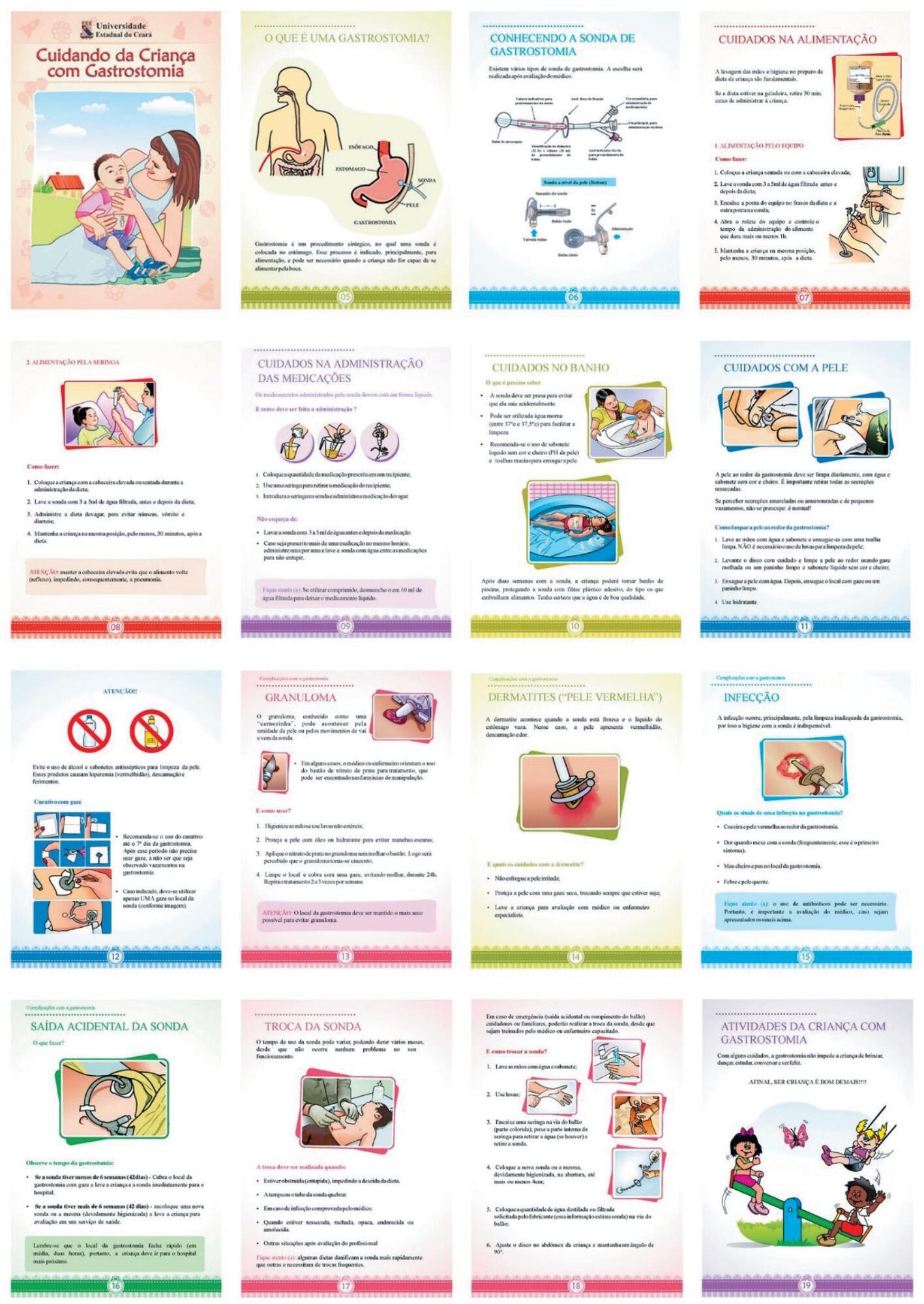
-
REVIEW12-05-2019
Hospital transition care for the elderly: an integrative review
Revista Brasileira de Enfermagem. 2019;72:294-301
Abstract
REVIEWHospital transition care for the elderly: an integrative review
Revista Brasileira de Enfermagem. 2019;72:294-301
DOI 10.1590/0034-7167-2018-0286
Views0See moreABSTRACT
Objective:
to identify evidence of scientific production on hospital transition care provided to the elderly.
Method:
an integrative review, with publications search in the MEDLINE, PubMed, LILACS, BDENF, Index Psychology and SciELO databases, with keywords and Mesh terms: elderly, hospitalization, patient discharge, health of the elderly, and transitional care, between 2013 and 2017 in English, Portuguese and Spanish. The 14 selected articles analysis was carried out through exploratory and critical reading of titles, abstracts and results of the researches.
Results:
transitional care can prevent re-hospitalizations as they enable rehabilitation, promotion and cure of illnesses in the elderly.
Final considerations:
transitional care implies the improvement of the quality of life of the elderly person, requiring skilled health professionals who involve the family through accessible communication.

-
REVIEW08-07-2020
Positive aspects of authentic leadership in nursing work: integrative review
Revista Brasileira de Enfermagem. 2020;73(6):e20190118
Abstract
REVIEWPositive aspects of authentic leadership in nursing work: integrative review
Revista Brasileira de Enfermagem. 2020;73(6):e20190118
DOI 10.1590/0034-7167-2019-0118
Views0See moreABSTRACT
Objective:
To identify and analyze the existing scientific production on the positive aspects of authentic leadership in the nurse’s work process.
Method:
This is an integrative literature review. The databases used were Scientific Electronic Library Online; Latin American and Caribbean Literature on Health Sciences; and National Library of Medicine – National Institutes of Health.
Results:
In this study, 17 articles were selected for analysis; 1 study (6%) was published in a national journal, and 16 (94%) were international studies. Of the 17 (100%) articles studied, 11 (65%) were developed in Canada. The hospital environment was present in the 17 (100%) articles.
Final considerations:
Authentic leadership has several positive aspects that significantly influence the nurse’s work process, such as engagement and job satisfaction, retention of new nurses, organizational commitment, among others.
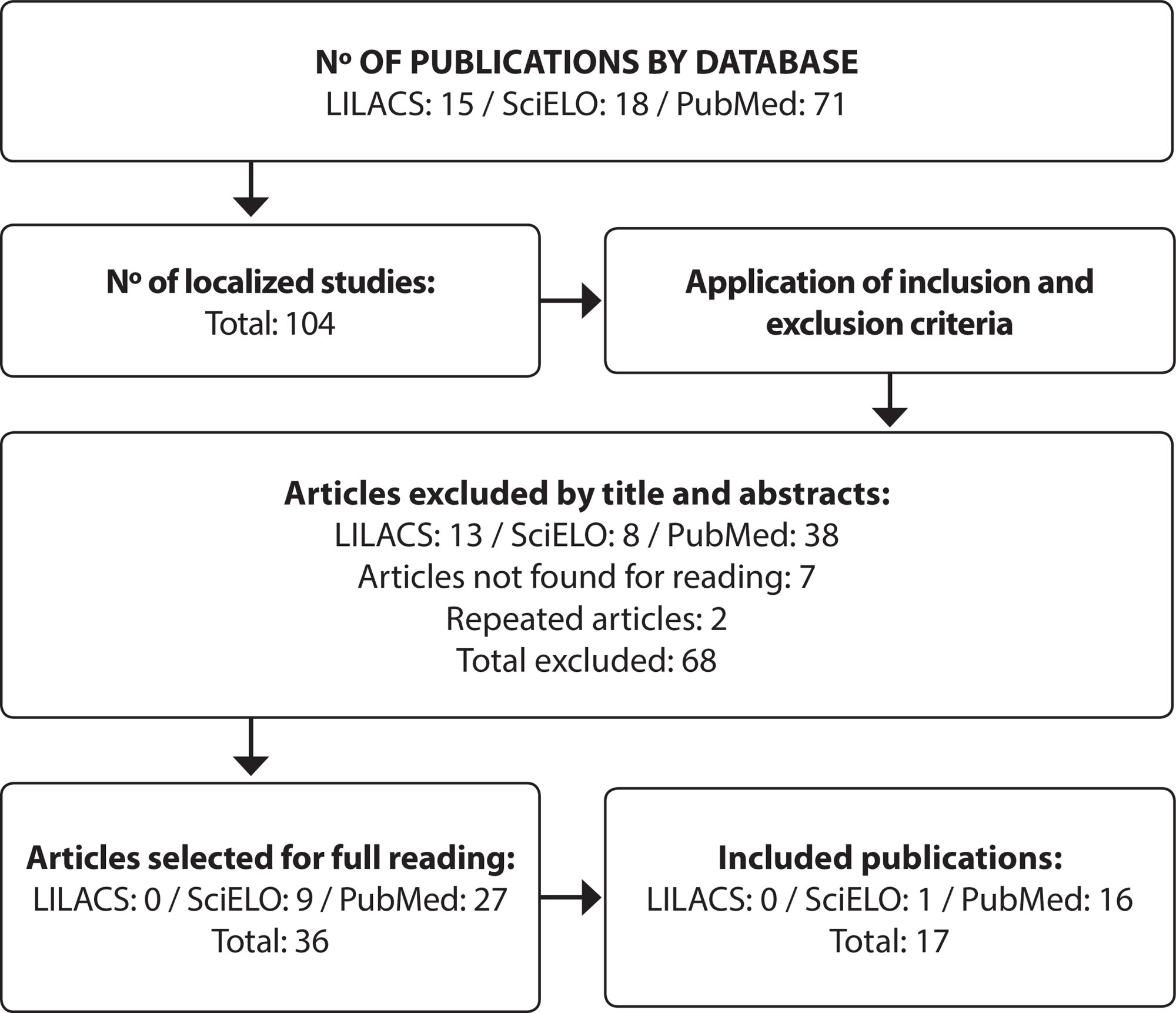
-
ORIGINAL ARTICLE12-21-2020
Development of an appearance validity instrument for educational technology in health
Revista Brasileira de Enfermagem. 2020;73:e20190559
Abstract
ORIGINAL ARTICLEDevelopment of an appearance validity instrument for educational technology in health
Revista Brasileira de Enfermagem. 2020;73:e20190559
DOI 10.1590/0034-7167-2019-0559
Views1See moreABSTRACT
Objectives:
to develop and evaluate the convergence of the instrument for the appearance validity of educational technologies in health.
Methods:
methodological study conducted in two steps. In step 1, the instrument items were developed, with subsequent content validity by nine specialists in the development of educational technologies in health. In step 2, the convergent validity between another instrument and the appearance instrument was performed. Correlation results above r> 0.3 and p <0.05 were considered as plausible convergent validity.
Results:
the ten items of the initial version of the appearance instrument were submitted to content validity that resulted in a final version with 12 items (Content Validity Index = 0.93). The correlation indexes were strong with the objective and appearance domains; moderate with motivation, organization and total; and weak with writing style.
Conclusions:
the appearance instrument demonstrated content validity and convergent validity, in addition to a strong correlation with the other instrument.
-
ORIGINAL ARTICLE02-10-2020
Burnout among nursing students: predictors and association with empathy and self-efficacy
Revista Brasileira de Enfermagem. 2020;73(1):e20180280
Abstract
ORIGINAL ARTICLEBurnout among nursing students: predictors and association with empathy and self-efficacy
Revista Brasileira de Enfermagem. 2020;73(1):e20180280
DOI 10.1590/0034-7167-2018-0280
Views0See moreABSTRACT
Objective:
to analyze burnout, its predictors and association with empathy and self-efficacy among nursing students.
Method:
cross-sectional analytical study with 284 students from five state universities in the state of Parana, Brazil. The instruments applied were: social and academic questionnaire, Maslach Burnout Inventory, Interpersonal Reactivity Index and Occupational Self-Efficacy Scale (Short Form). Spearman’s correlation and univariate and multivariate logistic analysis were used.
Results:
6.0% of the students presented high burnout, 36.3% presented high emotional exhaustion, 37.7% presented high depersonalization and 28.2% presented low personal accomplishment. The burnout predictors were: absence of physical activity; weekly workload >24 hours; low empathic concern. There were negative correlations between empathy (empathic concern and perspective taking) and depersonalization; self-efficacy and emotional exhaustion; and positive correlations between personal accomplishment and empathy and self-efficacy.
Conclusion:
Personal factors and an academic variable were burnout predictors among nursing students. The correlations suggest that self-efficacy and empathy can prevent burnout.
Search
Search in:
Nuvem de Tags
Adolescente (85) Atenção Primária à Saúde (239) COVID-19 (91) Criança (91) Cuidados de Enfermagem (269) Educação em Enfermagem (151) Educação em Saúde (139) Enfermagem (930) Enfermagem Pediátrica (86) Estudantes de Enfermagem (77) Estudos de Validação (131) Família (87) Idoso (208) Promoção da Saúde (99) Qualidade de Vida (104) Saúde do Trabalhador (86) Saúde Mental (145) Saúde Pública (82) Segurança do Paciente (150) Tecnologia Educacional (100)



